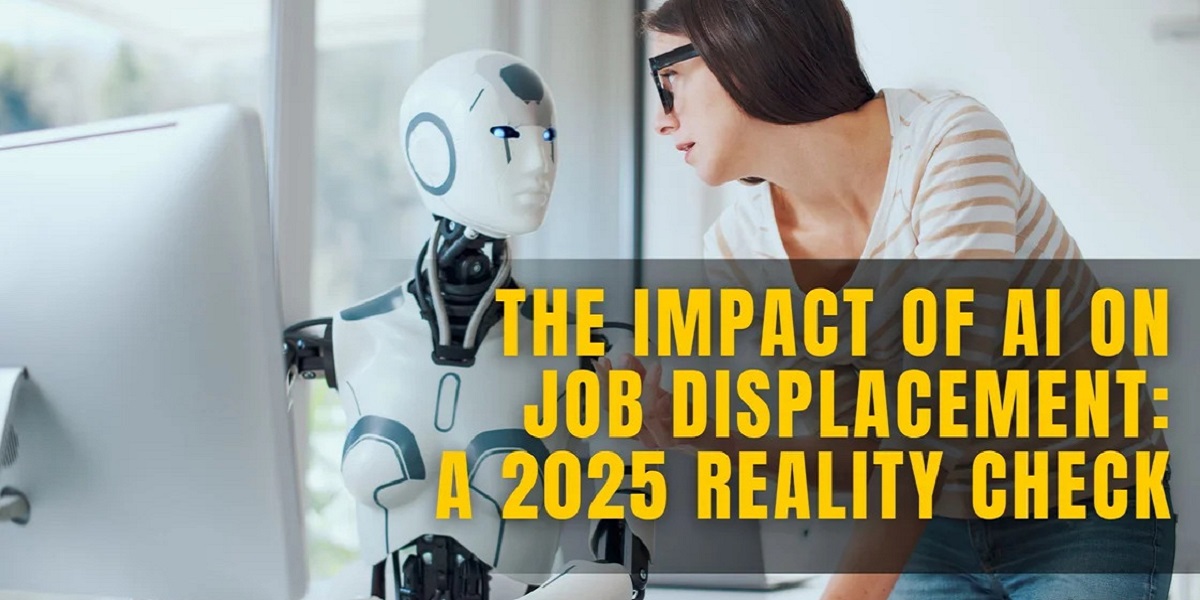The Impact of AI on Job Displacement: A 2025 Reality Check
Artificial Intelligence | 20-08-2025 | Jennysis Lajom

In 2025, Artificial intelligence will transition from a promising emerging force to a fundamental disruptor, revolutionizing the workforce at a rapid pace.
Although AI offers advantages, productivity gains, cost savings, and innovations are clear, the primary concern now is job displacement and change. The central argument isn't whether AI changes or eliminates specific jobs across sectors, but how.
This is a reality check, not a scare campaign. Instead of portraying AI as a force that we need to comprehend, learn from, and lead responsibly.
Let us explore how AI is reshaping employment this 2025.
Defining Job Displacement in the Age of Artificial Intelligence
Job Displacement describes when employees are laid off due to their jobs being overtaken or rendered obsolete by technology, either in the form of automation, robotics or software that can execute the same function quicker, cheaper and more efficiently.
While automation is not new, AI is different. Traditional automation is rule-based; machines follow sets of instructions. Yet, AI can learn, adapt, and make choices without incessant human intervention. This means AI is not only capable of replacing repetitive physical functions but also of replacing esoteric thinking functions that were previously considered unique to human beings.
The Profound Impact That AI Will Have On Society
Forget the idea that job displacement due to AI is looming in the future. According to a recent study, 76,440 positions were eliminated globally in 2025 alone as AI took over tasks better suited for machines
Just like any other complex matter, there will always be those who are in favour of it and others who are opposed to it. Artificial intelligence is not an exception to this rule. The gap between the two sides will widen in tandem with the introduction of new artificial intelligence techniques and the increasing coverage of them in the news.
Many market research analysts highlight AI's potential for positive social impact in areas such as productivity, healthcare, and education. However, adaptation is needed now.
Some individuals claim AI and robots are bad for jobs because they speed up the process of humans losing their jobs, particularly in physically demanding and repetitive positions.
Where Do Humans Stand in the Workplace with AI?
Artificial intelligence has made its way to every industry. In the past, this was an automatic system used in industry. Now, it is a system that is conscious and capable of making decisions, learning, and even exhibiting creativity. AI today is employed in the following areas:
- Manufacturing and Logistics: Human jobs have been replaced by robotics and AI-driven supply chain optimization.
- Customer Service: Customer support enquiries and technical assistance are now managed by chatbots and virtual assistants.
- Healthcare: AI helps with patient monitoring, diagnostics and admin duties, which means particular clerical jobs are needed.
- Finance: Algorithmic trading, fraud detection, and automated financial advising are now commonplace.
- Media and Content Creation: Articles, videos, and also music may be generated by AI techniques, which poses a challenge to conventional creative professions.
There is an increasing gap between jobs that are quickly automated and those that need human nuance and empathy and intricate decision making. Clarifying the roles that are still at risk is facilitated by understanding the process by which AI results in job displacements.
How AI Causes Job Displacement
Automation of Repetitive Tasks
In the areas of data entry, manufacturing and logistics, robots and software that are powered by AI have the ability to do repetitive tasks at a fast pace and at a cheaper cost.
Decision-Making and Problem-Solving
Machine learning algorithms are able to analyze a huge volume of information and make predictions with better accuracy than might be achievable with human interaction in a variety of areas, including finance, healthcare diagnostics and supply chain management.
Creative and Content Generation
Generative AI can develop articles, marketing content, graphics, music, and even movies, which were formerly tasks that required people with creative expertise.
Customer Interaction
Virtual assistants and chatbots driven by AI process millions of customer support enquiries daily, drastically cutting down on the need for a large contact center workforce.
Maintenance and Process Optimization
When it comes to production, artificial intelligence systems can predict when machines will fail, which diminishes the role of some maintenance individuals and dismisses some human roles.
Jobs That Are Most Likely to Be Automated
Customer service representative
Customers no longer interact with customer support agents over the phone; instead, they conduct all interactions online, with agents working remotely. Typically, customers have concerns and enquiries that are very similar to one another.
Finding solutions to these problems does not need a great degree of EQ or sociability. Consequently, AI can provide automated responses to frequently asked questions.
Accountants
The use of artificial intelligence to automate and improve accounting operations is on the rise among the enterprises. A further reason AI powered accounting services are flexible and secure choice for money engagement is that they are cloud-based.
To ensure reliable data collection, storage, and analysis, AI will utilize algorithms. The cost of using an AI accounting service is far lower than that of employing a human to do the same work.
Salespeople
There was a time when businesses relied on salesmen to manage their retail operations and marketing efforts to achieve success. It is becoming more vital for advertising to take into account the landscapes of the internet and social media.
Targeting marketing tools are pre-installed on Facebook, Twitter, and other social media platforms, enabling marketers to generate targeted content for a wide range of demographics. These tools are crucial components of social media platforms.
Research and analysis
Two areas that have begun to utilize AI to streamline operations and uncover new data are data analysis and research.
Data sorting, extrapolation, and analysis are now significantly more efficient due to recent advances in processing power. In the field of data analysis and research, humans may soon become unnecessary if AI continues to make progress in the right direction.
Warehouse work
The importance of automated techniques and processes for loading items into delivery trucks is growing in the rapidly expanding online sales industry. One technique for increasing efficiency has been the automation of repetitive processes.
Automating warehouse processes, such as shipment tracking and staff guidance, is made simpler using even the most basic types of AI. Potentially improving shipping capacities in the future, AI may automate loading and retrieval.
Jobs That AI Will Not Replace
Many believe that AI will generate more jobs than it eliminates. Many employees will be happy that AI will be not jeopardize their jobs and lives.
These professions demand flexibility and a wide range of activities, making them difficult for AI to completely replace.
Teachers
Many individuals often consult their teachers as a source of guidance and advice. Academic decisions are frequently determined by the extent to which a particular instructor has served as a source of motivation for us in the past. It is unlikely that we will ever have a teaching experience that is entirely delivered through digital means in the future, due to these factors.
CEOs and Managers
Organizational team management is an issue of leadership, which is not susceptible to codification and linear processing. Management and leadership are distinct concepts.
The CEO also has the important role of conveying the company's mission and values to their employees. Putting money into a company run entirely by computers or algorithms is probably not something most people would ever consider.
HR Managers
Even if artificial intelligence helps in recruitment by making the screening of resumes more efficient and less complicated, human resource managers are still responsible for a great deal of important tasks within an organization.
Recruiting new specialists is one of their abilities. They provide valuable work for the business by maintaining employee interest, identifying when workers are becoming disgruntled, and offering assistance in finding a solution when possible.
Psychologists and Psychiatrists
Their contribution are pretty crucial since they help employees to keep engaged, figure out when they are unhappy, and help them to settle disagreements.
Computer Analysts
Human intervention is still necessary for updates, upgrades, repairs and configurations in complex software and hardware systems, particularly when multiple specialists are needed, despite our efforts to automate mundane tasks.
The demand for computer analyst is strong because of the importance of their work reviewing system capabilities, controlling workflow and enhancing automation.
The Advancement of Skills: What Workers Need Now
The advent of AI has created a reskilling revolution at a massive scale. Employers no longer merely seek degrees—they're in search of agility, digital literacy, and emotional intelligence. These are the most in-demand skills of 2025:
- Data Literacy: It is now a must in all industries to understand how to read and work with data.
- AI Collaboration: Understanding how to collaborate with AI tools—instead of competing against them—is a major differentiator.
- Critical Thinking and Problem Solving: With routine tasks being handled by machines, the expectation is that humans will address more complex issues.
- Creativity: Ironically, the era of AI has rendered human creativity even more precious than before.
- Emotional Intelligence: Jobs that require empathy, negotiation, and interpersonal competencies continue to be challenging for AI to replicate.
Governments and corporations have introduced enormous upskilling programs, but access has been uneven—particularly in developing economies.
The Future of Work
A lot experts predict that AI will not altogether eliminate the need for labor but rather transform it. The difficulty is guaranteeing that employees can transition into new roles in a timely and fairly way. The societies that invest in reskilling and adjust to a rapid development and technological changes will excel better than those who resist it.
Final Thoughts
In 2025, the impact of AI on employment displacement is both enormous and inevitable. The primary challenge for society is the way in which we manage this transformation: Will this evolution can be beneficial, or will disruption determine who prevails or loses?
However, this is a development rather than a tale of loss. AI is creating chances for those who are ready to learn, adapt, and use the tools of the future.
The difficulty for workers is in developing abilities that AI cannot imitate. Ethically integrating AI and assisting people through these transformations are the responsibilities of enterprises. Society must prioritize the equitable distribution rather than letting them go into a small group.
The AI revolution is here. The question now is whether we will let it shape us—or whether we will actively shape the way it integrates into our world.

.jpg)

.jpg)
.jpg)
.jpg)
.jpg)
.jpg)


